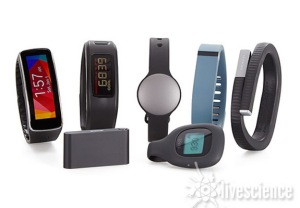You just got a brand new fitness tracker over the holidays to help you fulfill your New Year’s Resolution for 2016, and you are:
- Super intimidated by all of the fancy functions and not really sure how to connect it to your smartphone or if your tracker even has that capability
- Jealous of your friend who was able to financially afford a more expensive or fancier name-brand version and having doubts that your tracker will leave you disappointed
- Nervous that you might develop some unhealthy habits or mindsets because of your fitness tracker
- Some or all of the above
- [Insert how you’re in the comments section!]
Then take a moment and breathe and read on for some tips on how to incorporate your tracker into your life in a safer way.

Disclaimer: I use a fitness tracker, so I’ll be basing a lot of my advice off my own experiences as well as from what I’ve observed and learned from UNC college students. You’ll also find some links to data or resources — so click away!
A: Super intimidated by all of the fancy functions and not really sure how to connect it to your smartphone or if your tracker even has that capability
Tip: Find others who also use a tracker. Use social support!
In general, social support is associated with people being able to better cope with stress and an enhanced psychological well-being. There is a lot of evidence out there that already shows how crucial social support is for health education and health behavior. The American Council on Exercise notes that people with strong social support are more successful at lifestyle changes than those who do not have strong social support. You can take the 1st step and link up your tracker with others. Often times, your tracker has a function built-in that uses your phone contacts or social media friends to do that step for you — take advantage of this! Once you’re linked up, you can chat with your tracker friends and help each other learn the ins and outs of this new tech gadget. Together, you can take steps to incorporate fitness into both of your lives.

B. Jealous of your friend who was able to financially afford a more expensive/fancier name-brand version and having doubts that your tracker will leave you disappointed
Tip: Learn the strengths of your specific tracker and align them with your individual health goals.
It can be very easy to compare yourself with others, especially at a place like UNC. A lot of us have done this, including myself! With fitness, it’s especially important to devise YOUR OWN goals. What’s motivating your friend to be healthy might be very different than your motivation, and that’s totally okay! The fitness tracker you have might be absolutely perfect for what you’re trying to accomplish. If you find yourself wishing it did more and wanting to spend more money on a different product, try to find some creative ways of using your tracker by consulting with a health professional. Here are two examples:
- You own a simple step tracker, but you also have a health condition that requires a more tailored diet or fitness regimen. Your device may not tell you how many calories you’re burning, so speak to a health professional. They can help you figure out what your individual target goal should be based on your diet, physical activity, and health requirements. Knowing that about 2000 steps equate to 1 mile of walking, you can now approximate what number you should aim for on your step tracker to meet your caloric goal.
- Your device does not allow you to monitor food intake. After speaking to a health professional, you might decide that your personal health goal is to challenge yourself to make smaller changes in your life to strive for an overall healthier lifestyle. You can use your tracker as a cue to action to remind yourself to, for example, walk or bike to class more often, take the stairs rather than the elevator when you have a chance, or take three, deep, mindful breaths before you go to sleep at night.

C. Nervous that you might develop some unhealthy habits or mindsets because of your fitness tracker
Tip: Remember social support? It works here too! Find an accountability buddy.
In my experience of working at UNC Student Wellness and being an advocate for health promotion, this is a topic that often comes up when people speak to me about fitness trackers. Fitness trackers are a great innovation; however, there are some *trigger warning….* physical health and mental health risks associated with increased use of fitness trackers such as disordered eating, orthorexia, and exercise addiction. If you feel like you might be developing some of these habits, please reach out to UNC Campus Health Services.
Linking up to an accountability buddy can be extremely helpful and promote safety. You and your buddy can keep each other in check by giving each other permission to bring up any issues of concern.

Here are some signs to look out for in each other, according to the UC Davis Association for Body Image Disordered Eating:
- Body dissatisfaction
- Binge eating
- Dieting and/or purging behaviors
- Excessive, purposeless, physical activity that goes beyond a usual training regimen
Visit the UNC Campus Health page to learn more about recognizing signs and symptoms of body dissatisfaction and disordered eating in people of all genders.
I want to note that the idea of ‘excessive’ is of course, relative. However, you and your buddy can talk about this together and come up with a plan to recognize signs specific to your bodies, inspired by what signs are advised by health professionals.
Remember that all in all, your fitness tracker should lead you to make everyday decisions that help you more easily incorporate fitness into your lives. Good luck and be well, Tar Heels!
Niranjani Radhakrishnan received her BSPH from the Gillings School of Global Public Health at UNC Chapel Hill in 2013. She is currently a Program Assistant for Health Promotion and Prevention Initiatives at Student Wellness. She is also in graduate school at UNC Chapel Hill pursuing two masters degrees: Health Behavior and City and Regional Planning with an emphasis in environmental justice, health equity, and spatial analysis using GIS.